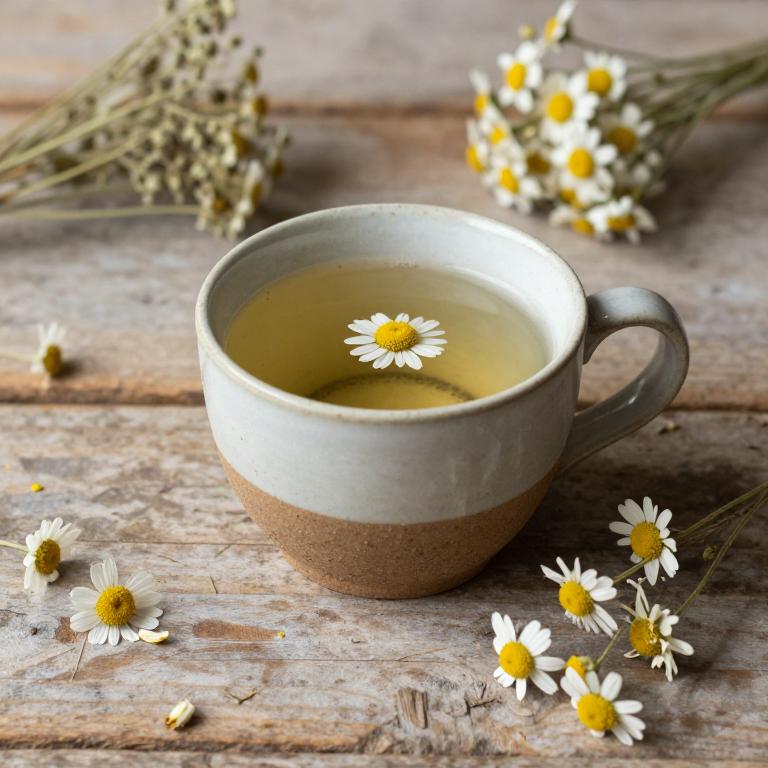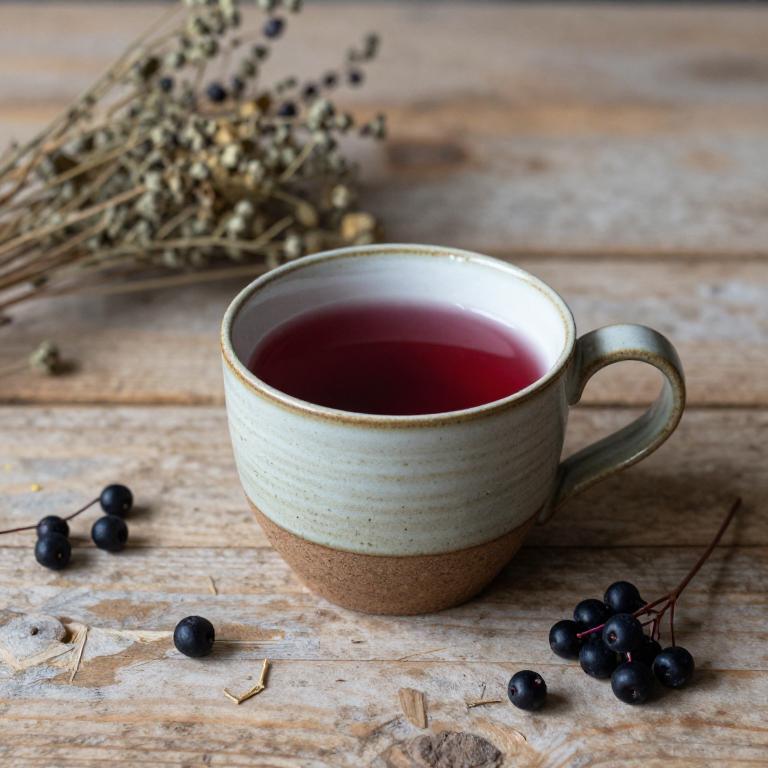10 Best Herbal Teas For Acne

Herbal teas can be a natural and effective way to support skin health and reduce acne symptoms.
Ingredients like chamomile, green tea, and licorice root are known for their anti-inflammatory and antibacterial properties, which can help calm breakouts and prevent future ones. These teas work by reducing excess oil production, soothing irritated skin, and promoting a balanced complexion. To use them, simply steep a few leaves or a sachet in hot water and drink it regularly or apply it topically as a compress.
Incorporating herbal teas into a holistic skincare routine may offer a gentle and sustainable approach to managing acne.
Table of Contents
- 1. Camellia (Camellia sinensis)
- 2. St. john's wort (Hypericum perforatum)
- 3. Chamomile (Matricaria chamomilla)
- 4. Stinging nettle (Urtica dioica)
- 5. German chamomile (Chamomilla recutita)
- 6. Salvia (Salvia officinalis)
- 7. Black elderberry (Sambucus nigra)
- 8. Rosemary (Rosmarinus officinalis)
- 9. English lavender (Lavandula angustifolia)
- 10. Dog rose (Rosa canina)
1. Camellia (Camellia sinensis)

Camellia sinensis, the plant from which green and black teas are derived, is often used in herbal teas for its potential benefits in managing acne.
These teas contain polyphenols, particularly catechins, which have anti-inflammatory and antimicrobial properties that may help reduce skin inflammation and combat acne-causing bacteria. Regular consumption of Camellia sinensis herbal teas may support overall skin health by regulating sebum production and improving skin texture. However, individual responses can vary, and it is advisable to consult a healthcare provider before incorporating these teas into a skincare routine.
While not a substitute for medical treatment, Camellia sinensis herbal teas can be a complementary part of an acne management strategy.
2. St. john's wort (Hypericum perforatum)

Hypericum perforatum, commonly known as St. John's Wort, is a herbal remedy that has been traditionally used for its potential benefits in treating acne.
This herb contains bioactive compounds such as hypericin and flavonoids, which may help reduce inflammation and regulate sebum production, both of which are key factors in acne development. While some studies suggest that St. John's Wort may have antimicrobial and anti-inflammatory properties, more research is needed to confirm its efficacy for acne treatment. When used as a tea, it is generally considered safe for most people, though it can interact with certain medications and should be used under the guidance of a healthcare professional.
As with any herbal remedy, individual responses may vary, and it is advisable to consult a dermatologist before incorporating it into a skincare routine.
3. Chamomile (Matricaria chamomilla)

Matricaria chamomilla, commonly known as chamomile, is a popular herbal tea used for its soothing and anti-inflammatory properties.
Chamomile tea contains compounds like bisabolol and chamazulene, which have been shown to reduce skin inflammation and redness, making it beneficial for those with acne-prone skin. Regular consumption of chamomile tea may help regulate sebum production and reduce the risk of acne breakouts by calming the skin's inflammatory response. However, it is important to note that while chamomile can support skin health, it should not replace conventional acne treatments without consulting a healthcare professional.
Overall, chamomile herbal tea offers a natural and gentle option for managing acne symptoms when used as part of a holistic skincare routine.
4. Stinging nettle (Urtica dioica)

Urtica dioica, commonly known as stinging nettle, is a herbal remedy that has been traditionally used for its anti-inflammatory and detoxifying properties.
When brewed into a tea, it may help support skin health by reducing inflammation and promoting the elimination of toxins from the body. Some studies suggest that the compounds in stinging nettle, such as flavonoids and antioxidants, may help regulate sebum production and reduce acne breakouts. However, it is important to note that individual responses to herbal teas can vary, and it is advisable to consult a healthcare professional before incorporating it into a skincare routine.
While urtica dioica tea may offer potential benefits for acne-prone skin, it should be used as part of a holistic approach that includes proper hygiene and a balanced diet.
5. German chamomile (Chamomilla recutita)

Chamomilla recutita, commonly known as German chamomile, is a popular herbal remedy often used in teas to support skin health and manage acne.
Its anti-inflammatory and antimicrobial properties help reduce redness, swelling, and bacterial growth on the skin, which are common factors in acne development. Chamomile tea can be applied topically as a compress or consumed internally to promote overall skin balance and detoxification. Regular use of chamomile tea may help soothe irritated skin and prevent future breakouts by regulating sebum production.
However, it is important to consult a healthcare professional before using it, especially for those with known allergies or sensitive skin.
6. Salvia (Salvia officinalis)

Salvia officinalis, commonly known as sage, has been traditionally used in herbal teas to support skin health and address acne.
The essential oils in sage, particularly thujone and camphor, possess antimicrobial and anti-inflammatory properties that can help reduce bacteria on the skin and soothe inflammatory acne lesions. Drinking sage tea may help regulate sebum production and reduce excess oiliness, which are common contributors to acne breakouts. Additionally, sage is believed to have a calming effect on the body, which may indirectly support skin health by reducing stress-related hormonal fluctuations.
While more research is needed, many individuals report improved skin clarity and reduced acne symptoms after incorporating sage herbal tea into their routine.
7. Black elderberry (Sambucus nigra)

Sambucus nigra, also known as European elderberry, is a traditional herbal remedy that has gained attention for its potential benefits in treating acne.
The tea made from its flowers and berries contains antioxidants and anti-inflammatory compounds that may help reduce skin inflammation and bacterial growth, both of which contribute to acne. Some studies suggest that the flavonoids in elderberry can support the immune system, potentially aiding in the body's fight against acne-causing pathogens. While it is generally considered safe when consumed in moderate amounts, it is important to consult a healthcare provider before using it as a treatment for acne, especially if you have underlying health conditions or are taking medications.
Overall, sambucus nigra herbal tea may be a natural complement to a comprehensive acne management plan, though it should not replace professional medical advice.
8. Rosemary (Rosmarinus officinalis)

Rosmarinus officinalis, commonly known as rosemary, is a popular herb used in herbal teas for its potential benefits in treating acne.
The essential oils in rosemary, particularly cineole and camphor, have antimicrobial properties that may help reduce the bacteria responsible for acne. Additionally, rosemary tea is believed to improve circulation and reduce inflammation, which can aid in healing skin blemishes. It is often recommended as a natural alternative to conventional acne treatments due to its soothing and detoxifying effects.
However, it is important to consult a healthcare professional before using rosemary tea, especially for those with sensitive skin or existing skin conditions.
9. English lavender (Lavandula angustifolia)

Lavandula angustifolia, commonly known as English lavender, is widely used in herbal teas for its calming and therapeutic properties.
This herb contains compounds like linalool and linalyl acetate, which have anti-inflammatory and antibacterial effects that may help reduce acne-causing bacteria on the skin. When consumed as a tea, lavender can support overall skin health by promoting internal balance and reducing stress, a known contributor to breakouts. Its soothing properties also make it a popular choice for topical application in skincare routines.
However, while lavender tea may offer some benefits for acne, it should not replace professional medical treatment for severe or persistent skin conditions.
10. Dog rose (Rosa canina)

Rosa canina, also known as dog rose, is a traditional herbal remedy that has been used for centuries to support skin health and treat acne.
Its flowers and hips are commonly used to make herbal teas that are rich in antioxidants, vitamins, and anti-inflammatory compounds. These properties help to reduce inflammation, balance sebum production, and promote healing of acne-prone skin. Rosa canina tea is generally considered safe and gentle, making it a suitable option for those seeking natural remedies for mild to moderate acne.
Regular consumption of this tea may contribute to overall skin improvement and help prevent future breakouts.